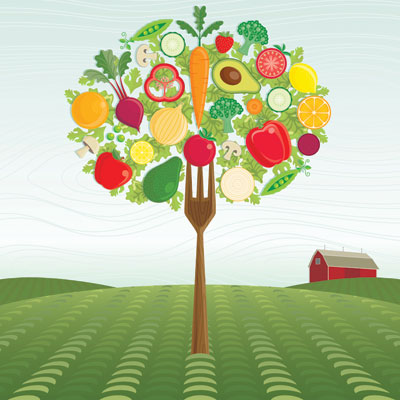BY JUDY ZIMOLA

Twice a week, delivery trucks across the state trundle up to store loading entrances to offload supplies. From neighborhood mom-and-pops where one can still find cooking lard to chain stores that tweet coupons, the majority of grocery stores carry, at most, a three-day supply of food—a practice called “just in time” economics. The scary thought is that if a natural disaster hit, the shelves would empty within hours. Granted, a clean-the-fridge soup is fun every now and then, but a large-scale catastrophe could destroy delivery routes into all parts of the state; an economic meltdown such as the crash of 1929 could turn aisles of artisan potato chips and bins of roma tomatoes into retail wastelands.
The bare-shelf truth is this—towns and individuals need to be prepared, and proactively put practices into place now to manage a potential food shortage if a crisis were to occur, natural or manmade. It’s also important to grasp the notion that paper money would be of little use during a catastrophic emergency. During the Great Depression, bartering became the new economy, and those with food, livestock, tools, and some special skills held all the wealth. What does that mean to our local economy?
“Let’s start with the basic need during a crisis—food,” says Ron Hubert, President and Chairman of the Board at Sustainable Economic Development Initiative – Northern Arizona and Adjunct Professor at Northern Arizona University. “Developing self-sufficiency through growing, buying, and selling small and locally is how communities can free themselves from supply-chain economics.”
Hubert cites the victory gardens of World War II as an example of the simplicity and beauty of the “small is beautiful” ethos. “When everybody—non-farmers, kids, schools— pitched in to grow food in whatever patch of land they had, using or borrowing whatever tools were available, it added up to 40 percent of all the vegetables consumed nationally.”
“Figuring it out” has special worth in a lean economy, and in the real world, people who know how to repair machines, preserve food, or turn old pants into warm coats will create wealth, or at least, a lack of want. “During a downturn, people need skills that enable them to make things that don’t rely on a lot of technology,” said Hubert. “Tool-sharing, fixing instead of replacing, bartering services for other services or food, builds a community’s independence. That’s valuable in the event the supply chain breaks down.”
Jonathan Netzky, founder of Local Alternative Catering in Flagstaff and chair of the Northern Arizona Sustainable Economic Development Initiative, Regional Food Production and Security Project Team, believes the key to creating a resilient community lies in building an infrastructure that supports the local system. To strengthen his business community’s foundation, he shares his commercial freezer with the local ranchers. “If they had to give it to a major distributor, that food would leave our community, which would increase its cost, and prolonged freezing would decrease nutritional value.” With a chuckle, he adds, “They’d have to send it out for it to come right back to us.”
Netzky’s vision of a sustainable community imbues the word “subsistence” with new dimension. “People subsisted for a long time, and it meant figuring out how to get the most value out of everything they had. To me, subsisting means getting not only the most value out of everything in front of you, but what’s around you; understanding the cycles of life, and developing a strong connection to the community.”
“Getting to know members of the community is our greatest safety net,” agrees Carolyne Slayton, Executive Director of Transition US, a nationwide organization with chapters in Pima and Tucson dedicated to “building resilient communities that are able to withstand severe energy, climate, or economic shocks while creating a better quality of life in the process.” Slayton believes that after food, water, and shelter, strong community ties are the next essential element.
Transition US creates opportunities for building connections at “Reskilling” festivals, where lost arts such as brining, tool repair, bee or chicken keeping, composting, etc., are taught by enthusiasts, not professionals, in the area. Slayton is a fervent believer in the quiet power of these festivals. “The ingenuity that’s unleashed at these events is incredible, interesting, thoughtful, and small, sweet, and potent. Benefits start shaping up from people meeting this way—carpools are formed, services are traded. And those bonds help a place respond much more effectively to whatever shock comes its way.”
Not to say there’s no room for entrepreneurship in a back-to-basics environment. Slayton sees the potential for enterprise to flourish in towns that strive to keep their business local. “Energy prices will rise, fuel consumption will slack, and tremendous business opportunities will be created. Niche businesses that have low transportation costs, or use alternative energy, are going to be in the best position.”
A trowel, a plan, and a creative, unflinching outlook at what can be accomplished through foresight and preparedness can go a long way to ease fears in a havoc-wreaking, fast-changing world. Bonds formed through sharing resources and recipes will strengthen a neighborhood’s amity and, by association, its resilience. As Jonathan Netzy sees it, “The good that is built into a healthy community is self-perpetuating.”








[…] supermarkets. Because of efficiency planning by the few large food distributors there is now just 3 days of food available in your local stores. If there is a major disruption of the distribution system that’s […]